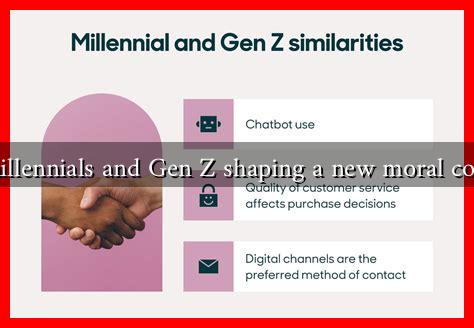-
Table of Contents
Are Millennials and Gen Z Shaping a New Moral Compass?
As society evolves, so do the values and beliefs that guide it. Millennials and Generation Z, two of the most influential demographics today, are at the forefront of this transformation. With their unique perspectives shaped by technology, social movements, and global challenges, these generations are redefining what it means to have a moral compass in the modern world.
The Rise of Social Consciousness
One of the most significant contributions of millennials and Gen Z is their heightened social consciousness. These generations are more aware of social issues than any before them, often using social media as a platform to advocate for change. This awareness has led to a shift in priorities, emphasizing values such as:
- Environmental Sustainability: Climate change is a pressing concern for younger generations. According to a 2021 survey by Deloitte, 77% of Gen Z respondents believe that businesses should be held accountable for their environmental impact.
- Social Justice: Movements like Black Lives Matter and #MeToo have gained traction largely due to the activism of millennials and Gen Z. These movements have sparked conversations about systemic racism, gender equality, and LGBTQ+ rights.
- Ethical Consumption: Younger consumers are more likely to support brands that align with their values. A 2020 study by McKinsey found that 67% of Gen Z consumers prefer to buy from sustainable brands.
Technology as a Catalyst for Change
The digital age has provided millennials and Gen Z with tools to amplify their voices and mobilize for causes they care about. Social media platforms like Twitter, Instagram, and TikTok have become essential for grassroots movements, allowing users to share information quickly and effectively. For instance:
- Viral Campaigns: The Ice Bucket Challenge and the #BlackLivesMatter hashtag are prime examples of how social media can drive awareness and action.
- Influencer Activism: Influencers often use their platforms to promote social causes, reaching millions and encouraging their followers to engage in activism.
- Online Petitions: Websites like Change.org have made it easier for individuals to start and support petitions, leading to tangible changes in policies and practices.
Redefining Work and Success
Millennials and Gen Z are also reshaping traditional notions of work and success. Unlike previous generations, they prioritize purpose over profit, seeking careers that align with their values. This shift is evident in several ways:
- Work-Life Balance: Younger workers are more likely to value flexibility and mental health, often opting for remote work or jobs that offer a better work-life balance.
- Entrepreneurship: Many millennials and Gen Z individuals are turning to entrepreneurship, driven by a desire to create businesses that reflect their values and contribute positively to society.
- Corporate Responsibility: Companies are increasingly held accountable for their social and environmental impact, with younger consumers favoring brands that demonstrate corporate social responsibility.
Challenges and Criticisms
While millennials and Gen Z are often praised for their progressive values, they also face criticism. Some argue that their activism can be performative, with social media campaigns lacking depth or follow-through. Additionally, the pressure to conform to social norms can lead to a phenomenon known as “cancel culture,” where individuals or brands are publicly shamed for perceived transgressions.
Moreover, the rapid pace of change can create generational divides, with older generations sometimes struggling to understand the motivations and values of younger people. This disconnect can lead to misunderstandings and resistance to change.
Conclusion: A New Moral Compass for a New Era
Millennials and Gen Z are undeniably shaping a new moral compass, one that prioritizes social justice, environmental sustainability, and ethical consumption. Their unique perspectives, fueled by technology and a commitment to activism, are driving significant changes in societal values and expectations. While challenges remain, the potential for positive impact is immense. As these generations continue to advocate for their beliefs, they are not only redefining what it means to be moral in today’s world but also paving the way for a more equitable and sustainable future.
For further reading on the impact of millennials and Gen Z on society, you can explore resources from Pew Research Center and McKinsey & Company.

